Russia and Iran have launched a new alternative payment system to SWIFT, designed to facilitate international trade without relying on the US financial system. This initiative connects 700 Russian banks with 106 institutions from 13 countries, fostering economic cooperation and enabling transactions in their own currencies, the rouble and rial. By circumventing the US dollar, they aim to strengthen trade volumes and enhance cross-border payments. This move responds to growing geopolitical tensions and the exclusion of these nations from SWIFT. If you're interested in the implications and future prospects of this initiative, you might want to explore further.
Key Takeaways
- Russia and Iran have established a new payment system to facilitate transactions outside of the US-dominated SWIFT network.
- The initiative connects 700 Russian banks and 106 banks from 13 other countries to enhance trade connectivity.
- This alternative payment framework promotes de-dollarization, allowing transactions without relying on the US dollar.
- Central banks of both countries oversee the regulatory framework to ensure compliance with international standards.
- The initiative aims to strengthen economic cooperation and increase trade volumes using national currencies, such as the rouble and rial.
Global Payment System Alternatives

As global trade evolves, countries are increasingly seeking alternatives to traditional payment systems like SWIFT.
You might consider regional payment networks like ACH and SEPA, which enable faster, cheaper transfers within the US and Europe, respectively. Local bank transfers also leverage existing infrastructure for efficient transactions, though they're limited to specific regions.
Fintech services, such as Wise and Remitly, offer competitive rates and user-friendly platforms for international transfers, while blockchain technology provides secure, borderless payments without intermediaries. Additionally, solutions like Airwallex streamline workflows and cost-effectiveness, integrating with accounting software.
These alternatives not only reduce fees but also enhance transaction speed, making them appealing options for countries looking to bypass conventional systems. Furthermore, platforms like PayPal Payouts operate in 156 global markets, allowing for diverse payment methods and automatic currency conversion.
New Payment Framework Unveiled
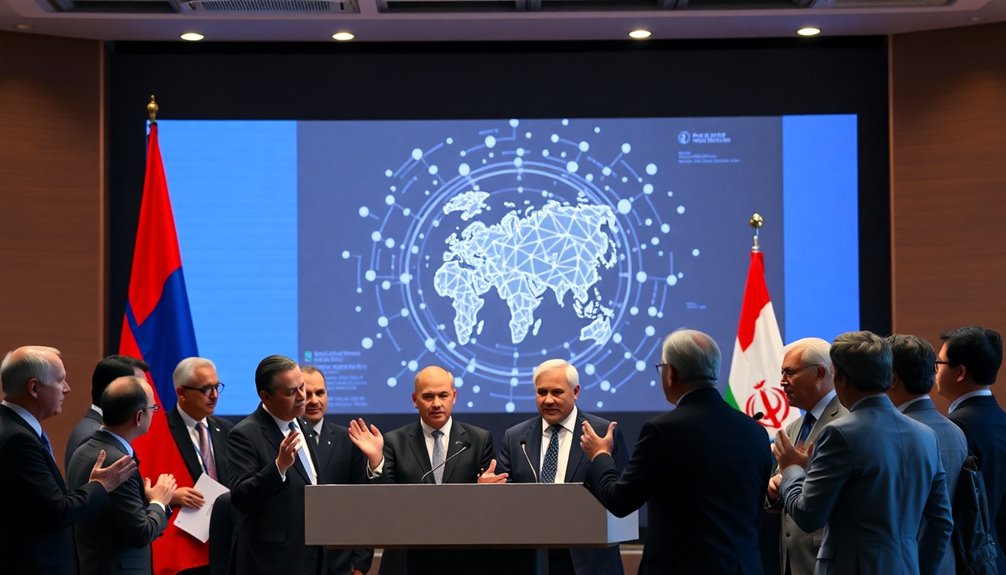
With the unveiling of a new payment framework, Iran and Russia are taking significant steps to establish a robust alternative to the SWIFT system. This new system connects their interbank communication networks, allowing both countries to facilitate trade outside the US financial system. It's designed to replicate SWIFT's functionality, processing interbank messages, transactions, and Letters of Credit. Around 700 Russian banks and 106 banks from 13 countries will participate, enhancing global reach. The framework promotes de-dollarization, enabling financial transactions without relying on the US dollar. Additionally, it strengthens economic cooperation between Iran and Russia, paving the way for increased trade volumes and seamless cross-border transactions through integrated bank card systems. This initiative marks a significant shift as both nations aim to reduce their reliance on the US dollar in international trade.
Payment System Adoption Rates
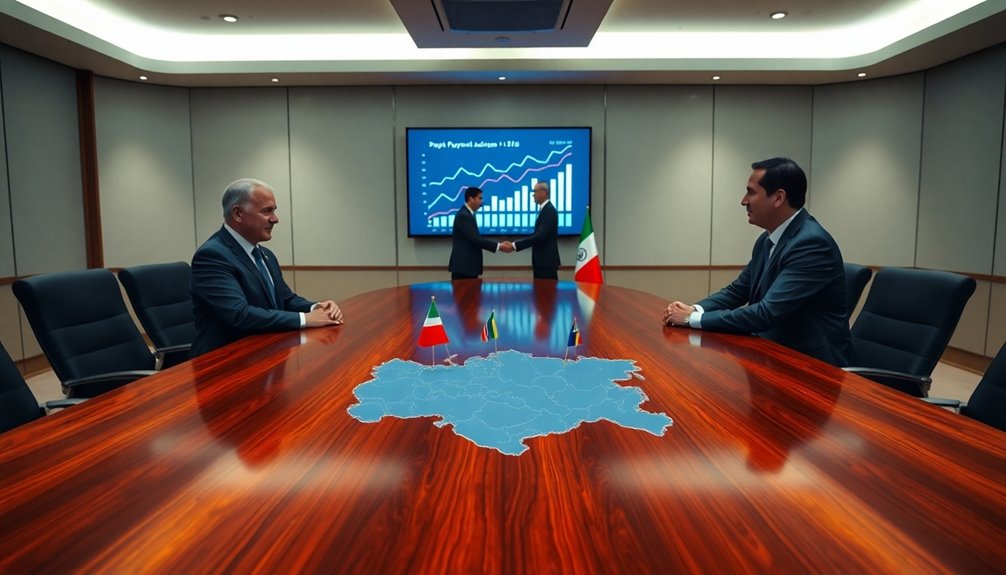
Understanding payment system adoption rates is crucial for grasping how new frameworks like the one between Russia and Iran can reshape international trade. Several factors influence these rates.
For instance, non-bank payment service provider participation boosts the number of transactions by 3.5% per capita. Additional use cases add another 2%, while public ownership contributes 1.8%.
Financial inclusion plays a significant role, as broader access to digital payments often correlates with increased adoption. Cross-border connections also enhance transaction volumes, adding 2% per capita. The significant growth in fast payments observed during the Covid-19 pandemic further highlights the potential for rapid adoption under favorable conditions.
As nations explore alternatives like the one proposed by Russia and Iran, these factors will determine how quickly their payment systems gain traction in the global marketplace.
Regulatory Framework and Compliance
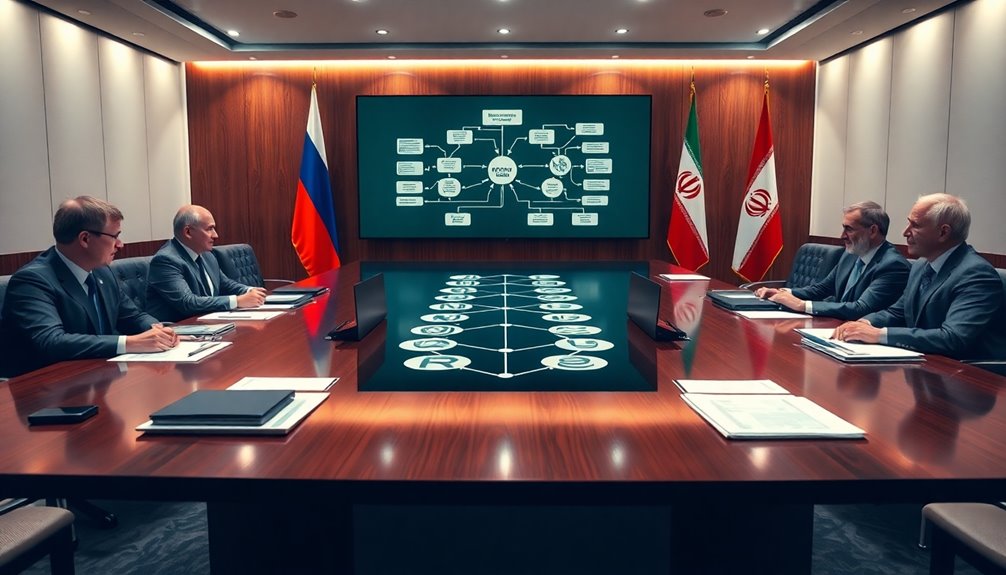
The regulatory framework surrounding alternative payment systems is vital for ensuring their legitimacy and functionality in global trade. Iran's and Russia's central banks oversee their respective financial transactions, establishing a legal basis for these new systems. Compliance with international standards is crucial, especially given the impact of US sanctions on Iran, which spurred the need for such alternatives. The systems, including SPFS and Iran's SEPAM, must adhere to international norms to maintain credibility and avoid further sanctions. Ongoing technical collaboration between both countries aims to enhance compatibility and security measures, ensuring trust among users. As they expand partnerships with foreign banks, the focus remains on developing robust regulatory structures to support their global financial aspirations. This collaboration is expected to bolster the use of the rouble and rial as tools for investment and cooperation.
Geopolitical Tensions and Alliances
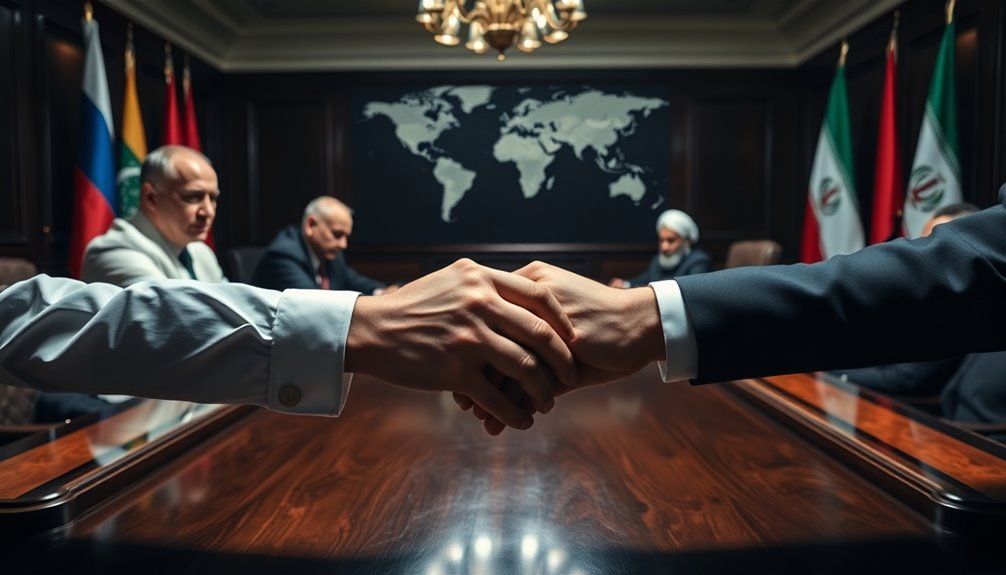
As geopolitical tensions escalate, Iran and Russia are forging stronger alliances to counteract the economic isolation imposed by Western sanctions.
Both nations have faced significant challenges, with Russian banks excluded from SWIFT after the Ukraine invasion and Iranian banks cut off since 2018.
In response, they're deepening economic cooperation, with trade volumes skyrocketing and agreements to use their national currencies for transactions.
This partnership aims to challenge Western influence, with Iran seeking to join the Shanghai Cooperation Organisation.
Together, they're developing alternative payment systems, like Russia's SPFS and Mir, which integrate with Iran's Shetab network. Moreover, their collaboration reflects a growing trend towards cross-border payment alternatives, as both countries look to reduce reliance on traditional systems like SWIFT.
Emerging Market Payment Trends
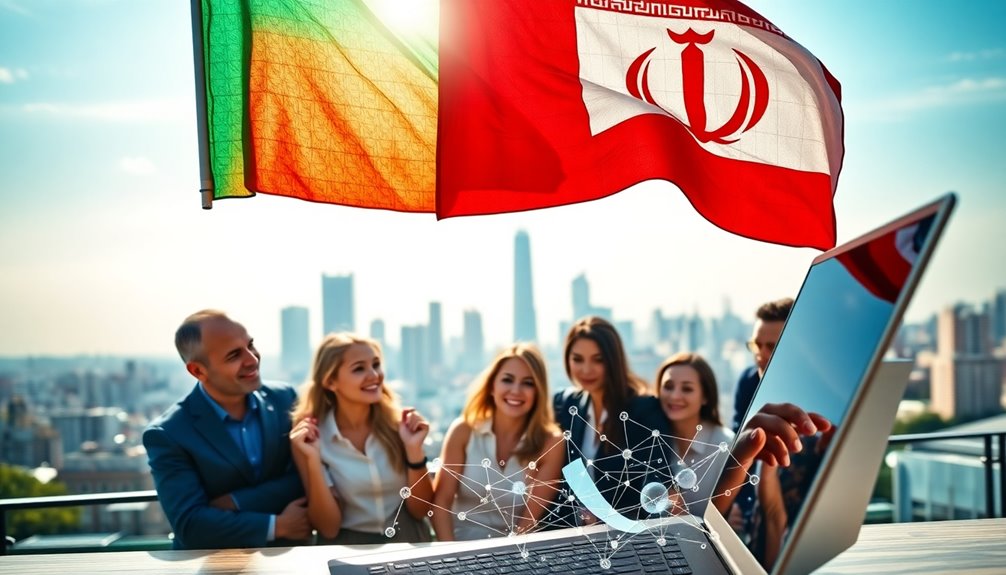
While traditional payment systems have dominated the global financial landscape, emerging market payment trends are rapidly reshaping how transactions occur.
Regional payment networks like ACH and SEPA offer faster, cheaper transfers, streamlining processes and reducing fees. Fintech money transfer services provide competitive exchange rates and lower transaction costs, making them attractive for users seeking efficiency. Additionally, the rise of crypto mining has contributed to the growing adoption of blockchain technology in payment systems.
Blockchain platforms enhance security and speed, enabling borderless transactions despite facing regulatory challenges. Furthermore, in 2023, SWIFT handled an average of 45.2 million transactions daily, highlighting the extensive use of traditional systems even as alternatives emerge.
Additionally, Russia and Iran's alternative payment system illustrates how emerging markets are finding ways to work around traditional systems like SWIFT, facilitating trade and cooperation.
These trends highlight a shift towards cost-effective, user-friendly solutions that cater to both regional and global needs, ultimately transforming the financial landscape.
Frequently Asked Questions
How Will This Alternative System Affect Global Trade Dynamics?
This alternative system could significantly shift global trade dynamics.
You'll notice reduced dependence on Western financial systems, which can help countries sidestep sanctions.
However, you might also face increased transaction costs and risks, as the system may not be as efficient or secure as existing ones.
As new economic partnerships emerge, you'll see a diversification of trade partners, but anticipate complexities that might affect competitiveness and overall trade volume.
Will Businesses Benefit From Lower Transaction Fees?
You'll likely benefit from lower transaction fees with alternative payment systems.
These systems often involve fewer parties, which means fewer fees and charges, making international transactions more affordable.
By reducing operational costs, you can enhance financial flexibility and improve cash flow management.
With lower fees, you'll be more encouraged to engage in international trade, ultimately increasing your business's trade volume and competitiveness in the global market.
What Currencies Will Be Supported in This Payment System?
Imagine making a seamless transaction without worrying about currency conversions.
In this payment system, you'll find primary currencies like the Russian Rouble and Iranian Rial, along with the Renminbi for international dealings.
You can also use local currencies from participating countries and even cryptocurrencies in the future.
Secondary options like the Euro and commodity-based currencies may play a role, making your cross-border transactions smoother and more efficient.
How Secure Is the New Payment Framework?
You'll find that the new payment framework is highly secure, employing advanced technical measures like encryption and strong authentication protocols.
Regular updates and robust firewalls protect against unauthorized access.
Operationally, it adheres to international standards, features strict access control, and conducts regular audits.
Additionally, an incident response plan ensures quick action in case of breaches.
With thorough testing for interoperability, you can trust that it's designed for seamless and secure transactions.
Can Other Countries Join This Alternative Payment System?
Yes, other countries can join this alternative payment system.
You'll find that the existing frameworks, like Mir and Shetab, are designed to accommodate new participants. As these systems expand, they create pathways for additional nations to connect and engage in seamless transactions.
Countries interested in de-dollarization and enhancing economic cooperation can explore integration, benefiting from reduced reliance on traditional systems and increasing financial independence. In light of shifting global dynamics, many nations are re-evaluating their monetary policies to mitigate the impact of external influences, such as Trump’s policies and global dedollarization. This movement not only fosters stronger regional ties but also promotes the development of alternative currencies and payment systems that can support equitable trade relationships.
The potential for growth is significant.
Conclusion
In light of Russia and Iran's announcement of an alternative to SWIFT, it's clear that the landscape of global payments is shifting. As countries seek to reduce reliance on traditional systems, you're witnessing the rise of new frameworks that promise greater flexibility. While these developments might ruffle some feathers in the West, they also open doors for emerging markets. Keep your eyes peeled; the tides are changing, and you don't want to be caught off guard!









